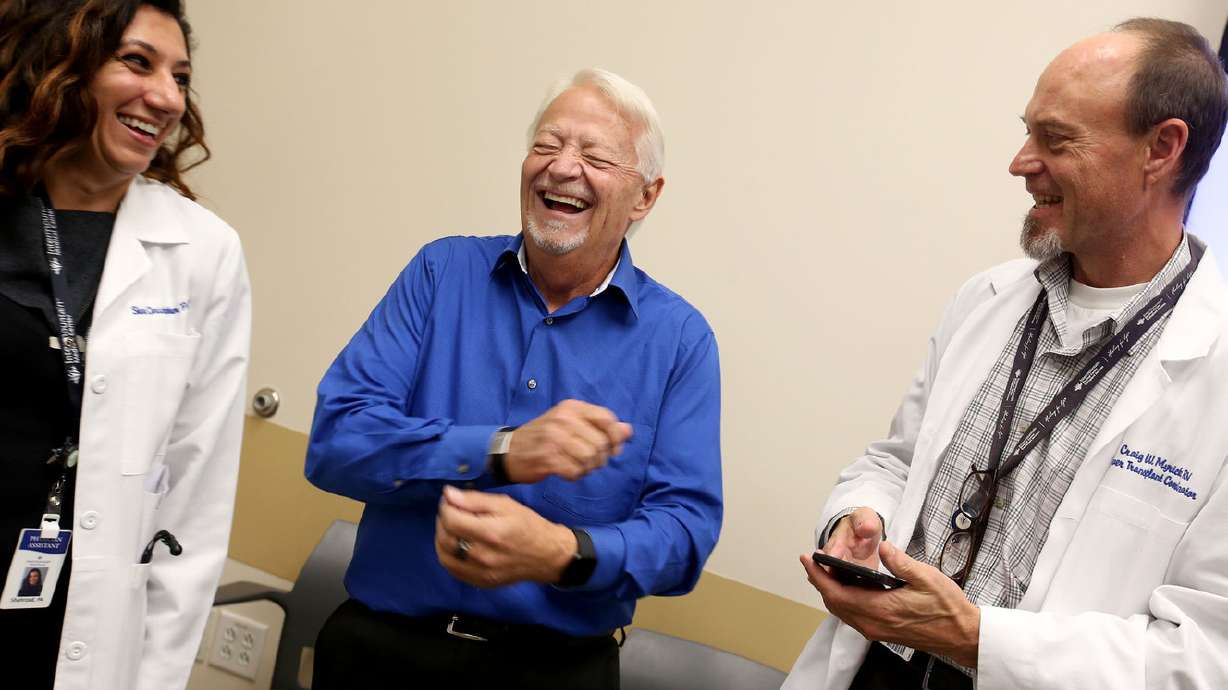Estimated read time: 4-5 minutes
This archived news story is available only for your personal, non-commercial use. Information in the story may be outdated or superseded by additional information. Reading or replaying the story in its archived form does not constitute a republication of the story.
MURRAY — Lorin Morse didn't know it, but his unhealthy lifestyle was slowly killing him.
"The doctor gave me two weeks to live," Morse said, adding that he recalls feeling progressively worse for a year before being admitted at Intermountain Medical Center in February.
"I would spend half of the time eating whatever little I could keep down and the other half of the time purging," he said.
Morse, 64, was suffering the effects of nonalcoholic fatty liver disease, a condition that gradually kills off liver function and eventually leads to death.
During a gathering Thursday to celebrate Intermountain's 1,000th liver transplant, which went to Morse, Dr. Richard Gilroy said he wants the whole state to be screened for the increasingly common disease. Gilroy, medical director of liver transplants and a gastroenterologist, estimates that 9,500 Utahns have the condition and don't know it
Fatty liver symptoms, including abdominal swelling, fatigue and liver pain, take a while to show — decades of destruction in Morse's case. And, Gilroy said, "once a person is hospitalized, they have a 30 percent chance of dying within 90 days."
Advertise with usReport this ad The disease occurs in all age groups, "but especially in people in their 40s and 50s who are at high risk of heart disease because of risk factors like obesity and type 2 diabetes," according to Mayo Clinic.
Gilroy said the youngest person who died with the preventable disease in Utah was 22.
"It's an incredibly costly disease to manage," he said, adding that because obesity rates continue to climb across the country, nonalcoholic fatty liver disease is getting a lot more common. Also because more people are gaining weight, and at younger ages, there are fewer options for transplantation when it becomes necessary.
"We're doing a really bad job at correcting this," Gilroy said.
Already, 2-of-3 patients suffering with the disease, he said, earn a spot on the liver transplant waiting list and 1-in-3 die waiting for a new liver.
Morse, however, lucked out and has thrived with his new liver — the 1,000th transplanted in Utah since 1986 — even though it was labeled "high-risk," having come from a young drug user who died.
It was still better than the liver he had, he said.
"So many of my friends and people I know took me by the hand and walked me through my own valley of the shadows of death," Morse said. "They told me to quit what I was doing to myself. And I did."
He spent just a week in recovery and hasn't looked back.
"I've done my very best to follow the rules," Morse, who lives in Highland, said, which include following a much healthier diet and regular exercise. "I got a do-over … I get to start over."

And he couldn't be happier with how his new lease on life is playing out.
Morse, who is divorced, is planning to marry a "sweet lady" he met online after he celebrates his one-year transplant anniversary in February.
Gilroy said Morse is a "remarkable" success story, but the fatty liver disease survivor also had to make some "incredible changes," having lost 105 pounds since his diagnosis.
"Losing weight is exceedingly difficult," Gilroy said, adding that the more weight a person has, the harder it is, as the body protectively tries to hold on to it.
"There's no magic pill," he said. In addition to weight loss and living a healthy and active lifestyle, the specialist suggests that people at risk of developing the disease follow a Mediterranean diet and regularly drink coffee, and in extreme cases, maybe consider bariatric surgery to help.
"We need to get upstream with this problem," Gilroy said, adding that he wants to screen the entire population of Utah to make a difference.
"To influence this disease, we need to do something now," he said.
Morse is quite grateful to the person who died as a registered organ donor so that he could live, as it was dicey there for a while.
Instead of feeling sick all the time, he's incredibly happy.
"You just get on your bike and you smile and ride," he said, adding that he's proud of the healthy lifestyle changes he has made. And while his own body parts were "trashed," Morse said he has the chance to never experience that again.
He also hopes more people choose to be donors, so others can experience a similar "gift of life." To register as an organ donor, visit www.yesutah.org.
For more information about or to be screened for fatty liver disease, contact a physician.
Correction: The caption for the photo of Lorin Morse giving a hug incorrectly identified the recipient as Dr. Diane Alonso. The recipient of the hug was physician assistant Shar Christopher.









